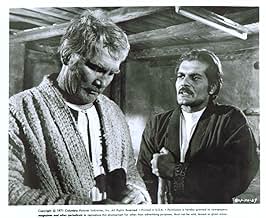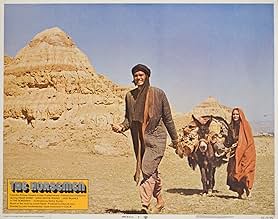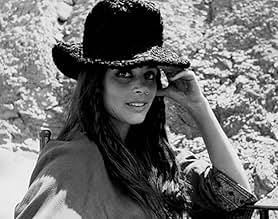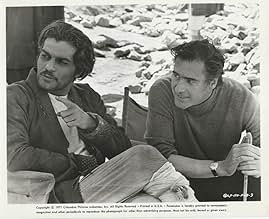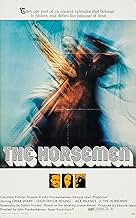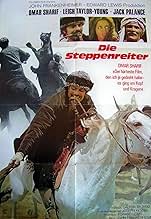IMDb RATING
6.2/10
1.4K
YOUR RATING
Drama depicting rural life in contemporary Afghanistan and the Afghani people's love for an ancient traditional sport similar to horseback polo.Drama depicting rural life in contemporary Afghanistan and the Afghani people's love for an ancient traditional sport similar to horseback polo.Drama depicting rural life in contemporary Afghanistan and the Afghani people's love for an ancient traditional sport similar to horseback polo.
- Director
- Writers
- Stars
Salmaan Peerzada
- Salih
- (as Salmaan Peer)
Aziz Resham
- Bacha to Ghulam
- (as Aziz Resh)
Vida St. Romaine
- Gypsy Woman
- (as Vida St Romaine)
Florencio Amarilla
- Arabian Man
- (uncredited)
Ishaq Bux
- Amjad Kahn
- (uncredited)
Carlos Casaravilla
- Messenger
- (uncredited)
- Director
- Writers
- All cast & crew
- Production, box office & more at IMDbPro
6.21.4K
1
2
3
4
5
6
7
8
9
10
Featured reviews
Adventures , thrills , horse riding and wonderful outdoors from Afghanistan and Spain
Spectacular movie with exciting adventures , horse-riding and marvelous Oriental landscapes in the desolate , poor northern provinces of the mountainous feudal Sunni kingdom of Afghanistan . The story is suitably emblematic and talks upon a champion Afghan horseman named Uraz (Omar Sharif) who participates with his horse in an extraordinary national game of "buzkashi" dating back to the time of Genghis Khan . It is a fierce competition, played on the steppes of the northern Afghanistan , before the Soviet-engineered republican revolutions . His father named Tursen (Jack Palance) is too old and has got a crooked leg , while Uraz is even prouder and with a morbidly self-destructive , he needs to prove himself against deadly dangers . Later on , he undertakes a risked journey to regain the honor he has lost after his defeat in the ceremonial game . On the journeys he loses a leg , is confronted by his servant (David Keyser) and an untouchable girl (Leigh Taylor Young) who want murder him , besides a nomad (Peter Jeffrey) who struggles his scraggy one-horned sheep . Each meeting has within the seeds of his own meaning and predicament . The final spectacle , including Omar Sharif's double , of the horseman along with his stallion is breathtaking and overwhelming.
This stirring motion picture blends adventures , thrills , spectacular horse-game , emotions and is pretty entertaining . From the beginning to the end , the adventure and drama is continuous ; for that reason packs a lot of entertainment , though it balances ups and downs . With a cast of thousands and genuine Afghan extras , being shot on actual locations . Sets and production design are spellbound and the Oriental landscapes are mesmerizing . It is based on Joseph Kessel's 1967 novel, "Les Cavaliers" ("The Horsemen"), Kessel spent almost fifty years of his life roaming the world and being adapted by the black-listed Dalton Trumbo . The film began shooting using 65mm negative (Super Panavision), but during production, Columbia went through a change in management. The budgets for this and another 65mm production, "MacKenna's Gold," were cut, and both films were forced to switch over to 35mm anamorphic Panavisión ; however, both were released in 70mm, with the later-shot sections blown up. Colorful cinematography by Claude Renoir filmed on location in Afghanistan and Almeria , Spain , where in the 60s and early 70s were filmed a lot of Westerns .Two/three weeks into shooting, cinematographer James Wong Howe left the Project , due to disagreement with director John Frankenheimer over use of lens. Sensitive and fascinating musical score by George Delerue .
The motion picture is compellingly directed by John Frankenheimer . At the beginning he worked for TV and turned to the cinema industry with The Young Stranger (1957) . Disappointed his with first feature film experience he came back to his successful television career directing a total of 152 live television shows in the 50s. He took another opportunity to change to the big screen , collaborating with Burt Lancaster in The Young Savages (1961) and Birdman of Alcatraz(62) ending up becoming a successful director well-known by his skills with actors and expressing on movies his views on important social deeds and philosophical events and film-making some classics as ¨The Manchurian candidate¨, ¨Seven days of May¨ and ¨The Train¨ . The flick will appeal to Oriental adventure enthusiasts and Omar Sharif fans . Rating: Good , well worth watching
This stirring motion picture blends adventures , thrills , spectacular horse-game , emotions and is pretty entertaining . From the beginning to the end , the adventure and drama is continuous ; for that reason packs a lot of entertainment , though it balances ups and downs . With a cast of thousands and genuine Afghan extras , being shot on actual locations . Sets and production design are spellbound and the Oriental landscapes are mesmerizing . It is based on Joseph Kessel's 1967 novel, "Les Cavaliers" ("The Horsemen"), Kessel spent almost fifty years of his life roaming the world and being adapted by the black-listed Dalton Trumbo . The film began shooting using 65mm negative (Super Panavision), but during production, Columbia went through a change in management. The budgets for this and another 65mm production, "MacKenna's Gold," were cut, and both films were forced to switch over to 35mm anamorphic Panavisión ; however, both were released in 70mm, with the later-shot sections blown up. Colorful cinematography by Claude Renoir filmed on location in Afghanistan and Almeria , Spain , where in the 60s and early 70s were filmed a lot of Westerns .Two/three weeks into shooting, cinematographer James Wong Howe left the Project , due to disagreement with director John Frankenheimer over use of lens. Sensitive and fascinating musical score by George Delerue .
The motion picture is compellingly directed by John Frankenheimer . At the beginning he worked for TV and turned to the cinema industry with The Young Stranger (1957) . Disappointed his with first feature film experience he came back to his successful television career directing a total of 152 live television shows in the 50s. He took another opportunity to change to the big screen , collaborating with Burt Lancaster in The Young Savages (1961) and Birdman of Alcatraz(62) ending up becoming a successful director well-known by his skills with actors and expressing on movies his views on important social deeds and philosophical events and film-making some classics as ¨The Manchurian candidate¨, ¨Seven days of May¨ and ¨The Train¨ . The flick will appeal to Oriental adventure enthusiasts and Omar Sharif fans . Rating: Good , well worth watching
A true gem!
This is a human condition action adventure that takes place in modern time( meaning 1971) Afghanistan. The film starts by showing how far back in time they are. Everybody is riding around on horses while planes are driving above them. In this country a proud (the best word would be prince but it doesn't exactly fit) Uraz (played by Omar Sharif, mostly known as that guy who had the lead in Doctor Zhivago) sets out to this weird horse tournament on the request of his father, a elderly clan leader and master of the sport played by the great Jack Palance.
It's made obvious from the start that though this man might be proud and even quite noble (he always bets on the weakest), he is in fact cruel to servants and have a rather nihilistic view on life. When he manages to fall off his horse and break his leg he feels a great dishonor and sets out to find the hardest and deadliest road home. On the way everything that is good in humans are questioned! The film has a very different view of the world than most others, at least this early in cinema. Many of the characters are so shady it will almost make you sick. I must say that I did not like these people as humans, though I did like their characters, inhuman behavior and cruelty is something I take a huge interest in. For those of you who enjoy to travel to different worlds and can enjoy and love films even if they perhaps have a different stand than your world view, this is the film for you.
I was quite taken by it I must say. My second favorite Frankenheimer picture to date, meaning that I thought it was better than great films such as The Manchurian Candidate, The Train and Seven Days in May. The colors are great and the mood and pacing is very intense. Most of the frames are quite beautiful. The acting is very good! And it's philosophy as a whole is rather good too but I will not give away anything about how this film turns out but I will say that I thought it was fabulous. A genius film! A masterpiece! You should definitely check it out. A true gem!
It's made obvious from the start that though this man might be proud and even quite noble (he always bets on the weakest), he is in fact cruel to servants and have a rather nihilistic view on life. When he manages to fall off his horse and break his leg he feels a great dishonor and sets out to find the hardest and deadliest road home. On the way everything that is good in humans are questioned! The film has a very different view of the world than most others, at least this early in cinema. Many of the characters are so shady it will almost make you sick. I must say that I did not like these people as humans, though I did like their characters, inhuman behavior and cruelty is something I take a huge interest in. For those of you who enjoy to travel to different worlds and can enjoy and love films even if they perhaps have a different stand than your world view, this is the film for you.
I was quite taken by it I must say. My second favorite Frankenheimer picture to date, meaning that I thought it was better than great films such as The Manchurian Candidate, The Train and Seven Days in May. The colors are great and the mood and pacing is very intense. Most of the frames are quite beautiful. The acting is very good! And it's philosophy as a whole is rather good too but I will not give away anything about how this film turns out but I will say that I thought it was fabulous. A genius film! A masterpiece! You should definitely check it out. A true gem!
'What a one-horned ram can do, a one-legged chapandaz can do better!'
Set in Afghanistan, John Frankenheimer's 'The Horsemen' is the story of a tribesman determined to rival his father at horsemanship
Uraz is sent by his father Tursen to win the traditional Royal Buzkashi on the field of Bagrami in the capital city of Kabul
Uraz on Jahil has to battle for control of a headless calf, carry it around a blue flag, and deposit it back in the 'Circle of Justice' thus signifying that he wins the king's pennant and remains as the master chapandaz of all Afghanistan During the tournament, opposing horsemen use their whips to urge on their horses and to hit the rider for the chance to snatch the heavy carcass
The motion picture turns around five well drawn characters: an angered son eaten up with vanity; a brave father who knew something worse than danger; a nomad woman whose touch defiles; a once loyal servant lusted for an 'unclean woman;' and a wager from the high passes of the East where 'men know how to forge fine weapons and use them well'
Uraz (Omar Sharif) deliberately chose to bribe his devoted servant with the magnificent white stallion in order to increase the already terrible dangers which he hopes to conquer
Zareh (Leigh-Taylor Young) urges her man to kill his high blood master to secure for herself his horse and his money
Tursen (Jack Palance) know nothing but evil legends about an impossible road taken by his embittered son His pain, remorse, and blood wept for a son lost through his fault
Mukhi (David de Keyser) forgets his humble and faithful world in the arms of the 'untouchable' woman who pushes him to murder the great prince
Hayatal (Peter Jeffrey) takes the challenge against 'the Prince Ram of the Valley' declaring openly to Uraz: 'What a one-horned ram can do, a one-legged chapandaz can do better!'
To understand 'The Horsemen' you must understand the rage, the beauty, and the tradition of a mountainous and landlocked country, isolated and left outside the mainstream of civilization
Written by Academy Award winner Dalton Trumbo (The Brave One, Best Original Screenplay, 1956) 'The Horsemen' is a passionate film for men only The film is a search that marks out the true concepts of honesty, integrity, loyalty, and trust
Uraz on Jahil has to battle for control of a headless calf, carry it around a blue flag, and deposit it back in the 'Circle of Justice' thus signifying that he wins the king's pennant and remains as the master chapandaz of all Afghanistan During the tournament, opposing horsemen use their whips to urge on their horses and to hit the rider for the chance to snatch the heavy carcass
The motion picture turns around five well drawn characters: an angered son eaten up with vanity; a brave father who knew something worse than danger; a nomad woman whose touch defiles; a once loyal servant lusted for an 'unclean woman;' and a wager from the high passes of the East where 'men know how to forge fine weapons and use them well'
Uraz (Omar Sharif) deliberately chose to bribe his devoted servant with the magnificent white stallion in order to increase the already terrible dangers which he hopes to conquer
Zareh (Leigh-Taylor Young) urges her man to kill his high blood master to secure for herself his horse and his money
Tursen (Jack Palance) know nothing but evil legends about an impossible road taken by his embittered son His pain, remorse, and blood wept for a son lost through his fault
Mukhi (David de Keyser) forgets his humble and faithful world in the arms of the 'untouchable' woman who pushes him to murder the great prince
Hayatal (Peter Jeffrey) takes the challenge against 'the Prince Ram of the Valley' declaring openly to Uraz: 'What a one-horned ram can do, a one-legged chapandaz can do better!'
To understand 'The Horsemen' you must understand the rage, the beauty, and the tradition of a mountainous and landlocked country, isolated and left outside the mainstream of civilization
Written by Academy Award winner Dalton Trumbo (The Brave One, Best Original Screenplay, 1956) 'The Horsemen' is a passionate film for men only The film is a search that marks out the true concepts of honesty, integrity, loyalty, and trust
Not A Book That Lends Itself To Cinema
This is an example of taking a book and adapting it to the large screen and realising with hindsight that it works better as a book . I'm not familiar with Joseph Kessel's original novel but the comments on this page state that the film is very faithful to the book and that might be the problem . It's a story that concentrates on obsession at winning at all costs and Uraz the protagonist is a universal metaphor for all mankind that when you want to win something it can cost you very dearly
You can perhaps see why the producers thought this would make a great film with its exotic locations and the fact it was st in Afghanistan before the land reforms the mid 1970s that led to civil war and the subsequent Soviet intervention is what made me seek out the film if only to understand Afghan culture better and the film does contain an intelligent opening when the audience are led to believe they're watching a scene from the 17th Century only to the Afghan rug pulled from under their feet as a jet plane screams over head . Likewise there's some spectacular scenes involving the sport of buzkashi where horsemen literally fight over the carcass of a dead goat and there's some impressive cinematography featuring the Afghan landscape but the inherent problem with the film is the character driven narrative which doesn't kindly lend itself to the medium of cinema
You can perhaps see why the producers thought this would make a great film with its exotic locations and the fact it was st in Afghanistan before the land reforms the mid 1970s that led to civil war and the subsequent Soviet intervention is what made me seek out the film if only to understand Afghan culture better and the film does contain an intelligent opening when the audience are led to believe they're watching a scene from the 17th Century only to the Afghan rug pulled from under their feet as a jet plane screams over head . Likewise there's some spectacular scenes involving the sport of buzkashi where horsemen literally fight over the carcass of a dead goat and there's some impressive cinematography featuring the Afghan landscape but the inherent problem with the film is the character driven narrative which doesn't kindly lend itself to the medium of cinema
Action adventure in Afghanastan: needs to become a DVD!
An excellent adaptation of the Book by Joseph Kessel; centered on the running of the first Buskashi in Kabul by the King of Afghanistan circa the 1950s. I have read the book in its English translation(1968) and seen the Movie on VHS.(1671) The movie is very fresh and not dated; and all the more compelling due to recent liberation from Arab control of that country. Footage of the Buskashi just has to be from a real game. The games were played at Bagram (Bagrimi) the plain above Kabul which was made an airport in recent years.
The author, Kessel can be compared to Joseph Conrad and Hemmingway as he apparently lived what he wrote. The book has themes just as penetrating as "Heart of Darkness" or "the Old man and the Sea" and much has translated well to this Movie. The acting is well done and convincingly. Local color shots were done in the late sixties giving this film a truly timeless feeling with little motor traffic evident.
One inspired scene has Jack Palance as Chief breeder and legendary Horseman, interrupted in his instructions to his team by the noise of a Jet; and looking up to see contrails above.
This is a real treasure just begging to be on DVD.
The author, Kessel can be compared to Joseph Conrad and Hemmingway as he apparently lived what he wrote. The book has themes just as penetrating as "Heart of Darkness" or "the Old man and the Sea" and much has translated well to this Movie. The acting is well done and convincingly. Local color shots were done in the late sixties giving this film a truly timeless feeling with little motor traffic evident.
One inspired scene has Jack Palance as Chief breeder and legendary Horseman, interrupted in his instructions to his team by the noise of a Jet; and looking up to see contrails above.
This is a real treasure just begging to be on DVD.
Did you know
- TriviaThe film began shooting using 65mm negative (Super Panavision), but during production Columbia Pictures went through a change in management. The budgets for this and another 65mm production, Mackenna's Gold (1969), were cut and both films were forced to switch over to 35mm anamorphic Panavision. However, both were released in 70mm, with the later-shot sections blown up. In later years, the mix-and-match formats made restoration of the films more time consuming and expensive than if they'd been shot entirely in 65mm, and they were preserved in 35mm only.
- GoofsWhen Tursen (Jack Palance) has a flashback to one of his past victories, one can tell that he is swinging a phony, lightweight, stuffed goat carcass around when his horse jumps up on the mud hut.
- Quotes
District Chief: What demon has possessed you to mock these good people with that piece of dog-bait?
- How long is The Horsemen?Powered by Alexa
Details
- Release date
- Country of origin
- Official site
- Language
- Also known as
- Konjanici
- Filming locations
- Afghanistan(Exterior)
- Production companies
- See more company credits at IMDbPro
Box office
- Budget
- $6,000,000 (estimated)
- Runtime
- 1h 49m(109 min)
- Sound mix
- Aspect ratio
- 2.35 : 1
Contribute to this page
Suggest an edit or add missing content



